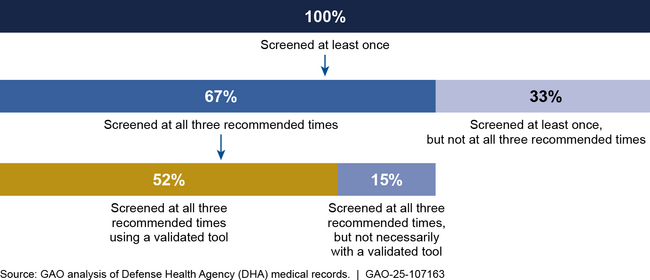Defense Health Care: DOD Should Monitor Mental Health Screenings for Prenatal and Postpartum TRICARE Beneficiaries
Fast Facts
Mental health issues like anxiety and depression are common during and after pregnancy. Service members and their families may be at higher risk, facing challenges such as deployment and isolation.
We estimated that about half of service members in the Department of Defense's TRICARE program who gave birth in military hospitals or clinics got all recommended mental health screenings. The screening rate was lower for those in TRICARE who gave birth in non-military facilities. But DOD doesn't monitor the frequency of these screenings.
We recommended addressing this to help ensure high-quality care for service members and their families.

Highlights
What GAO Found
The Department of Defense's (DOD) Defense Health Agency (DHA) oversees the TRICARE program that provides health care to beneficiaries—active-duty service members and their dependents. Beneficiaries receive care in military medical treatment facilities (direct care) and through civilian providers, generally administered by two managed care support contractors (private sector care). This care includes addressing mental health conditions that occur during and up to 1 year after pregnancy, known as the perinatal period.
GAO estimates that 52 percent of the 6,151 service members who delivered through direct care in fiscal year 2022 received DHA's three recommended perinatal mental health screenings. These screenings used one of two DHA-recommended tools and were performed at DHA's specified time intervals. All service members were screened at least once during their perinatal period.
Estimated Percentage of Service Members Screened for Perinatal Mental Health Conditions in Direct Care, Fiscal Year 2022

Note: The percentages in the figure represent those screenings that were conducted in accordance with DHA recommendations. GAO reviewed medical records for a random sample of 291 service members with live births in direct care—in a military medical treatment facility—in fiscal year 2022 out of a total population of 6,151. Estimates in this figure have a margin of error within plus or minus 6 percent at the 95 percent confidence interval.
For TRICARE beneficiaries in private sector care, two 2022 DHA contractor reviews showed significantly lower screening rates than direct care. For example, one contractor found that 30 percent of beneficiaries were screened at least once, and about 6 percent were screened more than once.
GAO found that DHA does not monitor or direct its contractors to monitor the frequency of perinatal mental health screenings in direct or private sector care. DOD has indicated that screening is its main prevention strategy for this high-risk group. Missing screenings could result in undiagnosed and untreated perinatal mental health conditions in TRICARE beneficiaries. By routinely monitoring the frequency of screenings in direct and private sector care, and taking corrective actions as needed to ensure adherence to DHA's recommendations and evidence-based practices, DHA can help ensure that beneficiaries consistently receive high-quality care.
Why GAO Did This Study
TRICARE provides health care to about 9.5 million eligible beneficiaries. In fiscal year 2023, there were about 89,000 births among TRICARE beneficiaries. Research shows mental health conditions such as depression and anxiety are the most common complications that develop during the perinatal period. Mental health is a critical part of military readiness. Factors such as isolation from social support networks may place military beneficiaries at risk of developing perinatal mental health conditions.
A report accompanying the National Defense Authorization Act for Fiscal Year 2024 includes a provision for GAO to review issues related to perinatal mental health in the military. This report examines the screening of TRICARE beneficiaries for perinatal mental health conditions in direct and private sector care.
GAO reviewed a generalizable sample of 291 service members' medical records that had a live birth in a military medical treatment facility in fiscal year 2022—the most recent year for which complete data were available. GAO reviewed DHA documents, two contractor reviews, and relevant laws. GAO also interviewed DHA officials and contractor representatives.
Recommendations
GAO is making two recommendations to DHA to routinely monitor the frequency of perinatal mental health screenings for TRICARE beneficiaries and take corrective actions as needed. DOD partially concurred with both recommendations. As discussed in the report, GAO maintains that the recommendations are warranted.
Recommendations for Executive Action
| Agency Affected | Recommendation | Status |
|---|---|---|
| Defense Health Agency | The Director of DHA should routinely monitor the frequency of perinatal mental health screening in direct care and take corrective action as appropriate if deficiencies are identified to help ensure provider adherence to DHA's screening recommendations. (Recommendation 1) |
When we confirm what actions the agency has taken in response to this recommendation, we will provide updated information.
|
| Defense Health Agency | The Director of DHA should routinely monitor through its contractors the frequency of perinatal mental health screening in private sector care and take corrective action if deficiencies are identified to help ensure provider adherence to evidence-based screening practices. (Recommendation 2) |
When we confirm what actions the agency has taken in response to this recommendation, we will provide updated information.
|
